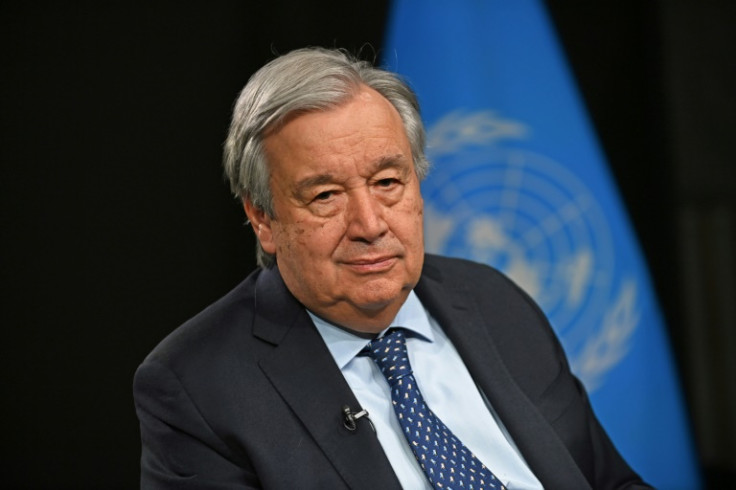
The COP28 climate conference should aim for a complete "phaseout" of fossil fuels, UN Secretary-General Antonio Guterres told AFP on Wednesday, warning of "total disaster" on humanity's current trajectory.
"Obviously I am strongly in favor of language that includes (a) phaseout, even with a reasonable time framework," Guterres said in an interview before flying off to the United Arab Emirates, the oil-rich nation hosting the two-week UN climate summit beginning Thursday.
With nations' actions falling far short of the Paris Agreement's most ambitious target of limiting global warming to 1.5 degrees Celsius, some countries have called for the COP28 final statement, which requires unanimous agreement, to explicitly call for a reduction in fossil fuel consumption.
That would be a historic first for a COP statement, as the Glasgow 2021 climate conference was only able to agree on mentioning coal.
But for Guterres, who has made fighting climate change a major priority as secretary-general, a simple promise to reduce fossil fuels would not be enough.
"I think it would be a pity if we would stay in a vague and noncommittal 'phase-down' whose real meaning would not be obvious for anybody," he said.
A phase-down "can be whatever, you never know exactly what it means -- to phase out means that at a certain moment, it stops," said Guterres.
He admitted however that nations "cannot stop tomorrow."
"We need to do it in an organized way and we need to make sure that we have a time framework that is simultaneously credible but at the same time is in line with our objective to keep the temperature rise at 1.5 degrees."
When asked about COP28 president Sultan Al Jaber, an Emirati official and CEO of the national oil company who has become embroiled in accusations of conflicts of interest, the UN chief said he had a "special responsibility" to influence the fossil fuel industry.
"He is of course linked to the oil business in his activities, but also linked to renewables, I think it creates with him a special responsibility," said Guterres.
He said Al Jaber was in a better position to tell the oil industry that the "solution of the climate problems requires the phase-out of fossil fuels" than "if he was member of NGO with a very solid pro-climate record."
"That will give him an opportunity to prove all those that accuse him wrong," said Guterres, who added the allegations against Jaber would be "inconceivable" to him.
Another key issue at the COP28 is the development of renewable energies.
"We need to triple renewable at the global level," Guterres said, and not just depend on the voluntary commitments of some states.
To that end, he hopes that COP28 will allow an advance in the idea of a "massive" global investment program in Africa, a continent that is experiencing an "absurdity," he said since the continent has 60 percent of solar capacity yet only two percent of solar investment.
There are a "large number of other measures that are essential to make this COP28 a success," he said, citing issues like climate justice.
Last year's COP27 in Egypt allowed for further progress in that regard, with the creation of a fund intended to compensate for the "losses and damages" of countries especially vulnerable to climate impact that have historically been the least responsible for greenhouse gas emissions.
But getting that started is complicated, requiring the upcoming COP to give a boost to the fund with announcements of "meaningful contributions," Guterres said.
With temperatures set to rise between 2.5 degrees Celsius and 2.9 degrees Celsius this century if nothing is done, the UN chief -- who warned of a "total disaster" if temperatures rise three degrees -- does not want to abandon the 1.5 degree objective, confident that technologies, and particularly renewable energies, will help achieve that goal.
"It is not dead, it's alive," Guterres said of the 1.5 degree goal.
"We have the potential, the technologies and the capacity and the money -- because the money is available, it's a question of making sure it goes into the right direction-- to do what is necessary, not only to keep the 1.5 degrees alive, but alive and well," he said.
"The only thing that is still lacking is political will," he said, adding that the upcoming gathering will have to make the world realize that "we are really moving in a very wrong direction still."







